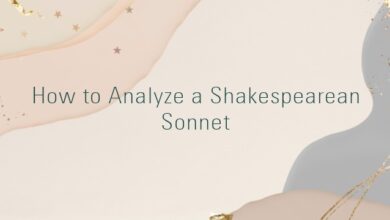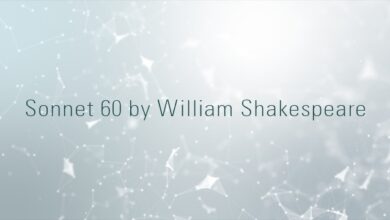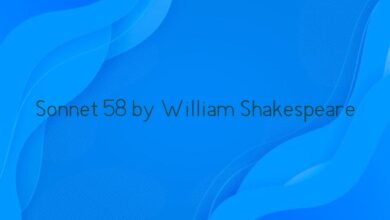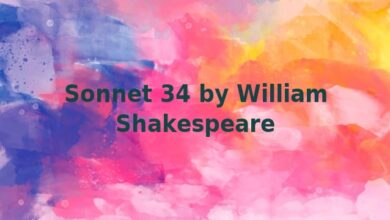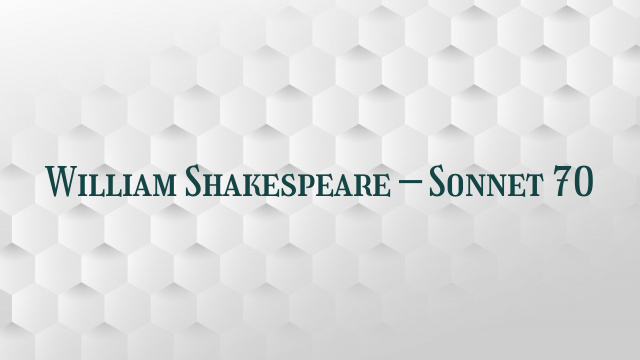
William Shakespeare – Sonnet 70
That thou art blamed shall not be thy defect,
For slander’s mark was ever yet the fair;
The ornament of beauty is suspect,
A crow that flies in heaven’s sweetest air.
So thou be good, slander doth but approve
Thy worth the greater, being wooed of time;
For canker vice the sweetest buds doth love,
And thou present’st a pure unstained prime.
Thou hast passed by the ambush of young days
Either not assailed, or victor being charged;
Yet this thy praise cannot be so thy praise,
To tie up envy, evermore enlarged,
If some suspect of ill masked not thy show,
Then thou alone kingdoms of hearts shouldst owe.
The poet attempts to defend his beloved against the slanderous accusations of the previous sonnet. Some casuistry is involved, as usually happens in these cases, but the conclusion is reasonably serene, and the power of the youth to rule over others by his beauty and perfection is acknowledged. If there were no blemishes, real or imaginary, attached to him, then surely he would be the wonder of the world and whole kingdoms would fall at his feet.
The 1609 Quarto Version
THat thou art blam’d ſhall not be thy defect,
For ſlanders marke was euer yet the faire,
The ornament of beauty is ſuſpect,
A Crow that flies in heauens ſweeteſt ayre.
So thou be good,ſlander doth but approue,
Their worth the greater being woo’d of time,
For Canker vice the ſweeteſt buds doth loue,
And thou preſent’ſt a pure vnſtayined prime.
Thou haſt paſt by the ambuſh of young daies,
Either not aſſayld,or victor beeing charg’d,
Yet this thy praiſe cannot be ſoe thy praiſe,
To tye vp enuy,euermore inlarged,
If ſome ſuſpect of ill maskt not thy ſhow,
Then thou alone kingdomes of hearts ſhouldſt owe.
Commentary
1. That thou art blamed shall not be thy defect,That thou art blamed = the fact that certain people (the tongues of the previous sonnet) find fault with you.
shall not be thy defect = shall not be counted as a defect, or as a blot on your character.2. For slander’s mark was ever yet the fair;slander’s mark = the target of slanderous tongues. slander is here personified.
was ever yet = always was, and still is.
the fair = those who are beautiful.3. The ornament of beauty is suspect,Suspicion always accompanies beauty, such that it seems to be a natural adornment of it. suspect is a noun, equivalent to the modern word ‘suspicion’. Describing suspicion as an ornament of beauty is rather odd, since ornamentation itself is supposed to beautify the object. It may be that the title is applied ironically, or there may be a suggestion that all ornaments are false and should be the object of suspicion.4. A crow that flies in heaven’s sweetest air.Suspicion (suspect) taints beauty in the same way that a crow taints the air of heaven by flying through it. A crow was considered to be a bird of evil omen, mostly because of its blackness. Thus in Macbeth
Light thickens, and the crow
Makes wing for the rooky wood;
Good things of day begin to droop and drowse,
Whiles night’s black agents to their preys do rouse. Mac.III.2.50-3.5. So thou be good, slander doth but approveSo thou be good = You only have to be good (in order to be a natural target); if you should choose to be good, or if you could only remain good.
approve = prove, confirm.6. Thy worth the greater, being wooed of time;Thy worth the greater = that your worth is greater (than previously thought).
being wooed of time = time also is in love with you. The phrase does not seem entirely apposite here, in that it does not follow on from the rest of the sentence. Commentators have struggled to find its meaning. The phrase may mean nothing more than ‘you are beautiful, in that time has bestowed gifts on you’. JK suggests that the corruptions of the age set out to seduce the youth (he is wooed by time), but when they do not succeed, since he remains good, the envious tongues of slander merely prove that he is even more worthy. The allurements of time are fickle (126) and it is not to be trusted. The line has the additional difficulty of the their/thy misprint.7. For canker vice the sweetest buds doth love,canker vice = vice, which is like a canker (a destructive maggoty worm). The gardener would no doubt complain that canker often attacks the best blooms.8. And thou present’st a pure unstained prime.
thou present’st = you present to the world, you show, or have shown (because the youthfullest days appear to have passed, according to the next line).
a pure unstained prime = a springtime of youth which is chaste and unsullied. unstainéd – the ‘ed’ is pronounced.9. Thou hast passed by the ambush of young daysambush – temptations lying in wait which are set by the world and the devil. It is not clear how young young is in the poet’s mind, or how old the youth is now. It is hardly worth mentioning that the statement is a flat contradiction of 35, 40-43. Perhaps all has been forgotten or the poet still feels a duty to exonerate the youth whatever happens, especially as the accusations are made by alien tongues who have no right to do so. Only those may criticise who have been wounded, and they have the right to forgive.10. Either not assailed, or victor being charged;not assailed – not attacked by temptation.
victor being charged = victorious when charged in battle. The metaphors are military, but there may be a suggestion of a legal attack, with slanderous tongues drawing up a charge sheet.11. Yet this thy praise cannot be so thy praise,this thy praise = the praises of you listed above, chiefly that you are unstained, and that slander misses its mark.
cannot be so thy praise = cannot forever be so powerful as praise (that it succeeds in tying up envy).12. To tie up envy, evermore enlarged,
envy – the motive of the slanders of ‘tongues’ is suggested.
evermore enlarged = perpetually at liberty. Envy is personified as a wild and raging beast which cannot be confined.
To enlarge = to set free.
Enlarge the man committed yesterday
That railed against our person. H5.II.2.4113. If some suspect of ill masked not thy show,suspect = suspicion, as in line 3.
ill = evil, sin, bad character.
masked not thy show = did not cover your appearance, as with a mask.14. Then thou alone kingdoms of hearts shouldst owe.owe = own, possess. If some stain, whether justified or not, were not attached to you, then you would reign in love over multitudes of people. (Whereas now I alone am your slave, and enjoy the privilege of being the one who loves you).

